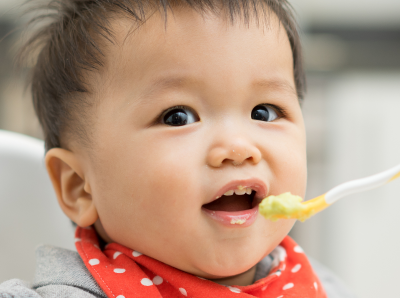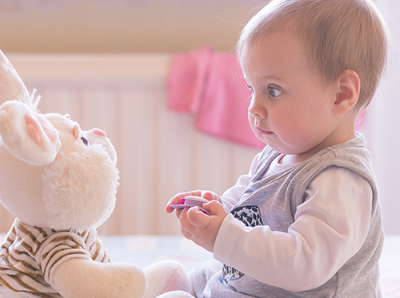
A Guide to Feeding your Baby
Here’s our guide to feeding your baby in the first 12 months. Guidelines with ages can only ever be approximate as babies develop at different rates.
Just remember, there’s a wide range of what’s considered ‘normal’ baby development, so if you’re concerned about your baby’s progress, have a chat with your doctor or maternal health nurse.
Month-on-month baby feeding guide
One month
At first, your baby may breastfeed every few hours – as much as 12 times a day. Let them feed whenever they want, as this will help build up your milk supply.
Two months
Your baby might go through a growth spurt at about this time, so be prepared for lots of breastfeeding.
Three months
Your baby should still only be drinking breast milk or formula. All the developmental changes they are going through may make bub much hungrier some days. Don’t take it as a sign they aren’t ready for weaning though – the digestive tract is still not fully developed so solid foods are still off limits.
Four months
They’re likely to be much more efficient at feeding now, so will need fewer feeds in total. Infant feeding guidelines recommend introducing solid foods around 6 months, but not earlier than 4 months.
Five months
Some babies may show they’re interested in drinking from a cup by grabbing yours. If you introduce a cup make sure you do so safely. They’ll still be breast or bottle fed and might be ready for solid foods, but check with your doctor or mental health nurse.
Six months
When your infant is ready, at around 6 months, but not before 4 months, start to introduce a variety of solid foods, starting with iron-rich foods, while continuing breastfeeding. Learn more about starting solids.This is generally the time your baby starts to show signs of teething, learn more about baby teething advice.
Seven months
Baby might be eating a range of solid food now and enjoying the experience of discovering different tastes, flavours and textures. You may need to offer the same food several times before he begins to get used to the new taste, so be patient. Around this time, you can also try baby-led weaning. Bub may be able to start using a 2-handled cup or a beaker, but could still need help from you.
Eight months
They’ll want to feed themselves using new picking up skills and holding a bottle or cup, but hand and eye co-ordination may not always result in all the food going in their mouth. Mealtimes should include an increasing variety of foods. Try finger foods – bite-size pieces they can pick up themselves. Learn more about baby food ideas for 8 month olds. Always supervise your baby while they’re eating to reduce possibility of choking.
Nine months
As they’re now eating finger foods they’ll love joining you and the rest of the family at the table. To cut down on cooking, think about meals you can all eat or that they can eat elements of. Eating is likely to be a messy process – especially when bub starts trying to use a spoon – but it’s nothing to worry about if it’s an enjoyable experience for them.
Ten months
With growth beginning to slow down, your baby’s appetite may decrease. They may start to show some food preferences, but continue to offer a variety of different kinds of food and textures. Encourage your baby to feed themselves. Learn more about feeding advice for 10 month old babies.
Eleven months
Your baby will likely be reaching for food and feeding themselves using their hands at this stage. They can also hold a cup and drink from it, although they’re likely not yet ready to put it down carefully afterward. If you haven’t already, consider getting a baby sippy cup. Your baby’s new-found independence means they might reject foods at mealtimes. We suggest offering a few healthy choices so she can exercise her decision-making but still get the nutrition she needs.
Twelve months
Meal time is often when your baby’s independence comes to the fore, as eating is one of the few areas of life she can control. If they’re become a fussy eater, don’t worry. Keep food available so she can have little portions during the day, and trust that they will eat when they gets hungry. For more tips on managing fussy eating.




As your baby progresses through key development milestones, ensuring that their food journey also progresses is important. Rafferty’s Garden is here to support a positive start on your baby’s food journey with nutritious and delicious products, free from nasties.







